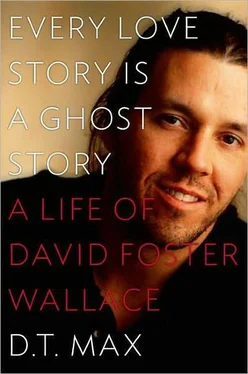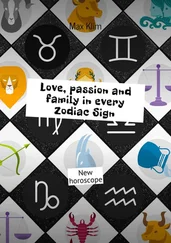He wrote some speculations in the margins of Alice Miller’s The Drama of the Gifted Child , a book Karr gave him. He recognized himself in Miller’s description of the unhappy, talented child. “Ouch” and “Gulp,” he speckled in the margins. After Miller wrote:
As soon as the child is regarded as a possession for which one has a particular goal, as soon as one exerts control over him, his vital growth will be violently interrupted.
Wallace penciled “SFW,” his mother’s initials. (Inadvertently proving her reach, next to the word “effect” in the same paragraph, he wrote, “s/b [should be] affect.”) He ascribed his current predicament to having a “narcissistically-deprived Mom.” There is an intemperateness to Wallace’s explorations of his childhood here, the anger he felt at his mother’s supposed obfuscations unleashed again as he discovers his own — but then he had come to believe the one had led directly to the other.
He read John Bradshaw’s Bradshaw on the Family , a pop bestseller on dysfunction and childhood, and where Bradshaw wrote that low-self esteem translated into “believing that your worth and happiness lie outside of you,” he noted, “Writing Success Fame Sex.” Wallace wanted to become the sort of person for whom desire for the last three did not motivate the first. That was one of the goals of the therapy, as it was, indirectly, of recovery. As he worked his way through his past, on the advice of a therapist he told his mother that they should stop talking, which led to an estrangement that would last on and off for some five years.
As the fall turned into a remarkably snowy winter, Wallace’s relationship with Karr deteriorated further. The two fought bitterly. Karr, Wallace wrote Franzen, was prone to “terrible temper-outbursts.” She found him spoiled, a mama’s boy using rehab as an excuse for self-absorption. Her needs were more concrete — food, money, child care for her son. He still wrote her constantly, even though he was just around the corner. He printed out in huge letters on a computer the words “MARRY ME” and added, “No shit, Mary Karr, do not doubt my seriousness on this. Or the fact that I’m a gila-jawed bulldog once I’ve finally made a commitment, a promise. My expectation is not that it would be easy, or all the time pleasant. My expectation is that it would be real, and illuminated.” Karr knew it would not work out, she remembers, when one day she asked Wallace to pick up Dev from school and Wallace said he needed his car to go to the gym instead. Thinking back on all his failed relationships, in the margin of Bradshaw he blamed them on his “fantasy bond” with his mother.

In April 1992, Nadell submitted the first 250 pages of Wallace’s novel—“structurally…not much like any other novels I’ve seen,” as Wallace had written in his cover letter — to Howard at Norton. The submission contained the major lines of the novel — the Incandenza family, Gately and Ennet House, and the plot to find the master copy of “Infinite Jest,” a movie so absorbing that watching it could kill you. In a country addicted to television, it would be the ultimate weapon, an entertainment neutron bomb. The novel was set in the near future but no reader could mistake it for anything other than a commentary on the present day. Reading the manuscript, Howard was amazed by the changes he saw in his author’s writing. Wallace had gone from a clever writer to a profound one, from one with lots of ways to say little to one with one way to say something important. He now saw Wallace’s addiction, descent, and recovery as “a ceremony of purification.” He was eager to publish the new work, but Norton was a conservative house. Its taste was mainstream (it would soon have a huge success with Patrick O’Brian, the purveyor of seafaring tales), and did not put out much in the way of avant-garde writing— Girl with Curious Hair was an exception, but it had sold only twenty-two hundred hardcover copies. Howard went to his editorial board and asked how much he might offer. They authorized him to pay an advance of $35,000. Wallace calculated what would be left to live on after expenses and his agent’s commission. He was taking the psychic risk of asking for an advance so he could write without teaching, but $5,000–$6,000 a year wouldn’t do it.
Nadell quickly found another bidder, Michael Pietsch, an editor at Little, Brown, who in June 1992 bought the book for $80,000. Pietsch had worked with other innovative writers like Rick Moody and had been quietly supportive of Wallace’s work when few were — when Wallace had just graduated from Arizona he had tried to help him place some stories in magazines. Pietsch told Nadell he wanted to publish Infinite Jest “more than I want to breathe.” Wallace wrote Pietsch to accept his offer, citing his “gut instinct (I have so few gut instincts I am reverent when one manifests).” He thanked him for advancing enough money that he could “get health insurance and fix my car if it breaks and buy books so I can mark them up.”
Wallace avoided confrontation with authority figures, so it is a testimony to his faith in his judgment this time that he now wrote Howard with frankness, assuring the editor who had been through so much with him that his decision to sign with Little, Brown was not “a…go-for-the-gold-type pressure situation.” He explained, “I not only wanted to quit dicking around with teaching and try to be a professional writer, but also wanted to try to live like a grown-up while I did so…. If that compromise seems venal or ungrateful,” he added, “so be it.” He said he was “qualmless” but finished on a more conciliatory point for the editor who had meant so much to him:
You have believed in me and supported me and given me good counsel and good faith at every turn; you are more important to me than I bet you could believe.
With Pietsch, Wallace had some immediate damage control to do: his new editor also edited Leyner. How to tell him that in his essay on television, still forthcoming, he spent a half dozen pages flaying one of Pietsch’s best-known writers? Harper’s and he had finally agreed that the television piece was wrong for the magazine, but Steve Moore had picked it up for the Review of Contemporary Fiction and, titled “E Unibus Pluram” (“Out of One, Many”), it was to come out the next summer. Wallace wrote to his new editor to explain what he found missing in Leyner’s writing, almost as if writing a review of his earlier self:
Brains and wit and technical tightrope-calisthenics are powerful tools in fiction, but I believe that when they’re used primarily to keep the reader at arm’s length they’re being abused — they are functioning as defense mechanisms. Leyner is a hidden writer, as so many exhibitionists and actors and comedians and intellectuals are hidden. I do not wish to be a hidden person, or a hidden writer: it is lonely.
He promised Pietsch that Infinite Jest would supply the element missing in Leyner’s work, would make, as he’d written about Wittgenstein’s Mistress , “the head throb heartlike”:
I want to improve as a writer, and I want to author things that both restructure worlds and make living people feel stuff, and my gut tells me you can help me.
As an editor, Pietsch was used to being in loco parentis ; he felt no need to take sides. He responded, “My notion about Mark Leyner is that he doesn’t feel any compulsion to do more in his work than entertain, surprise, and dazzle…. It’s fine to want more from a book but that doesn’t lessen the legitimacy of his accomplishment.” But he added, “All that notwithstanding, it was with delight I read of your intention to pursue selves and stories.”
Читать дальше













